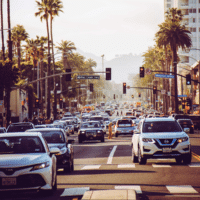By Darren G. Mayers. Esq.
Driving is the most dangerous thing most Americans do each day. Virtually all of us know someone who has been injured in an automobile accident. Automobile accidents are a public health crisis, and somehow the pandemic made it worse. With more people working from home, traffic has decreased. Yet, despite less drivers getting behind the wheel in 2020, automobile accidents have surged, with fatal vehicle accidents hitting a 15-year high.
Americans traveled 263 billion miles in March 2021, according to the Department of Transportation. This is a 42 billion mile increase over March 2020. The spike indicates a near-return to pre-coronavirus levels of vehicle commuters, and the roads appear to be increasingly unsafe. As traffic returns to pre-pandemic levels, fatal accidents continue to increase. The reason is not entirely clear, but it seems to have something to do with the pandemic altering traffic patterns.
Why the Increase in Traffic Accidents?
According to the National Highway Traffic Safety Administration, there was a 7.2% increase in traffic-related deaths from 2019 to 2020. The agency noted that the major factor was speeding. With less traffic on the roads, traffic speed dramatically increased. As common sense tells us, the higher the speeds, the less reaction time, the more injuries we have, and the more fatal crashes we have.
In Los Angeles, 294 people were killed on City streets in 2021. This was a 24% increase over 2020. L.A. officials say the 2021 data suggests motorists are distracted by cell phones, driving at excessive speeds, and driving recklessly.
The Human Toll and Litigation Costs of Severe Traffic Accidents
This increase in traffic accidents and fatalities increases the burdens on auto insurance carriers in auto repair costs, the cost of the associated litigation, and the payouts related to the more serious injuries.
The median wrongful death verdict in California has increased to $2.2M versus $1.45M nationally. The median traumatic brain injury (“TBI”) verdict in California is $1.6M compared to $1.45M nationally. In Superior Court, County of Santa Barbara, a jury in Flick v. Reyes (2020) awarded the Plaintiff $1.6M for a TBI with mild cognitive impairment, based on defendant’s high-speed DUI. In Hernandez v. Wu (2020) a Superior Court of San Diego case, the jury awarded $3.6M to a good Samaritan who left her vehicle to assist a disabled motorist, when she was hit by defendant who was speeding and could not stop on the wet roadway. Plaintiff suffered a concussion, post-concussion syndrome, and facial scarring.
How Do We Reduce the Number of Motor Vehicle Accidents?
As a result of the increase in serious auto accidents, both California and the Federal government are taking measures to reduce the number and severity of traffic accidents. The goal is to bring down the extraordinary human cost and societal cost of increased insurance rates and litigation costs. Controlling speeds on roads is the most important goal of any car safety strategy. There are two main ways to do that: change the physical design of the road with “traffic calming” measures that encourage slower driving, like narrowing traffic lanes and adding speed bumps, or changing the legal speed limit, which is easier and less expensive but less effective.
The City of Fremont, California, like many other American cities, has developed a Vision Zero program. This program is a transportation engineering approach that considers the loss of life from traffic crashes to be unacceptable and identifies safety as the highest priority for the transportation system. The bold goal of Fremont’s Vision Zero program is to eliminate fatalities and significantly reduce severe injuries. The program accepts that some accidents are inevitable due to driver mistakes, but City traffic engineers seek to design and operate a traffic system so that the inevitable crashes do not cause death or serious injuries. Fremont’s traffic engineers proactively use data to address high-risk locations and behaviors. As a result of the Vision Zero program, the City of Fremont has reduced traffic fatalities and severe injuries by 45 percent between 2015 and 2020.
All American states will benefit from the recently announced National Roadway Safety Strategy. The program will be paid for by the Biden Administration’s $1 trillion infrastructure law. The program has the impossible sounding goal of “zero highway fatalities.” The program’s focus is to redesign roads, reduce speeds and push for more vehicle safety measures. Seleta Reynolds, general manager of the L.A. Department of Transportation applauds the newly announced federal program. He called the program a “huge cultural shift that puts safety first, with a clear strategy that includes funding, actions, and timelines.” Further, Reynolds called the plan a tremendous win for Los Angeles because with federal funding we have a much better opportunity to address the wave of traffic violence that has torn apart far too many families and communities.
The state of California has also instituted new traffic safety laws. Prior to July 1, 2021, using a handheld cell phone was punishable by a fine. As of July 1, 2021, violating the hands-free cell phone law while driving, twice within a 36 month period, will result in a point being added to one’s DMV record.
Beginning July 1, 2025, a court will be permitted to suspend a person’s driver’s license between 90 days and six months if a person is convicted of exhibition of speed if the violation occurred as part of a “sideshow.” Section 23109(c) of the California Vehicle Code will define “sideshow” as an event in which two or more persons block or impede traffic on a highway for the purpose of performing motor vehicle stunts, motor vehicle speed contests, motor vehicle exhibitions of speed, or reckless driving for spectators.
Auto insurance carriers are also doing their part to reduce auto accidents. Inflation is increasing, making repairing an automobile more costly. Medical care costs are soaring. Insurance costs are steadily increasing. As insurance costs go up, so does the cost of insuring a vehicle. Insurers provide many incentives to their insureds to slow down, buckle up and minimize distractions while driving.
This multi-pronged approach from local, state, and federal agencies as well as auto insurance carriers should reduce traffic speeds and fatal and severe injury accidents. These programs can have tremendous benefits to both consumers and auto insurers. They may reduce insurance premiums for consumers due to reduced accident costs to the auto insurance carriers. Also, the auto insurance carriers will benefit by reduced litigation costs associated with fewer severe and fatal accidents.
As more people return to the streets in Los Angeles and throughout the State of California, it is important that we all take steps to reduce our risk of being involved in a severe traffic accident. Be sure to watch your speed, stay off of your cell phone, and always be aware of the traffic around you.


